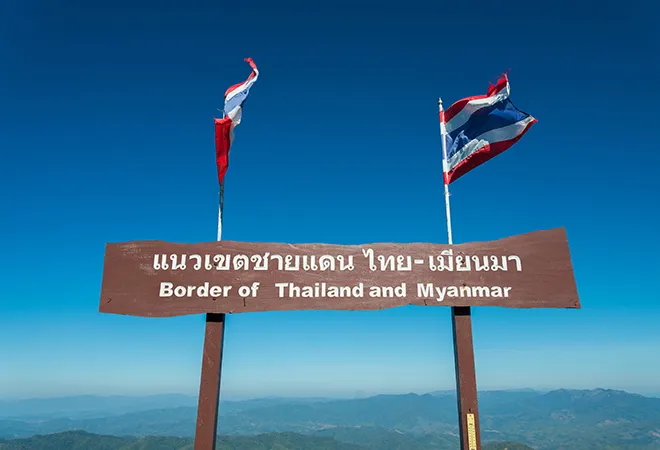
A massive tide of displaced persons is flowing across the 2,416-kilometre Myanmar–Thailand border, as hostility spreads and engulfs the entire region. Growing displacement rates from Myanmar have been horrifying in the last couple of days. The attack on Christmas eve, which killed over 30 individuals, including women and children of the Karen community and two Save the Children employees, by the Myanmar Junta has sent waves of fear across the nation. The fact that they were captured and burnt alive has been hard to stomach. Moreover, the air raids on the following Christmas day have destroyed several villages, killing numerous citizens, especially those from minority ethnic communities under the dominant regime.
The current events have sparked an international response where Noeleen Heyzer, the UN’s Special Envoy to Myanmar, while condemning the act has called for “a New Year’s ceasefire” throughout Myanmar. The United Nations Security Council has called for accountability for the Christmas Eve massacre. The statement has called for, “the immediate cessation of all violence and emphasised the importance of respect for human rights and of ensuring the safety of civilians.” Simultaneously, in a joint statement on 30th December, 67 Karenni community organisations from around the world demanded that the Myanmar Junta be held accountable for the massacre on Christmas eve and other crimes.
The air raids on the following Christmas day have destroyed several villages, killing numerous citizens, especially those from minority ethnic communities under the dominant regime.
The Junta has a history of committing human rights abuses in the Kayin state, also known by its former name, Karen state. Karen is one of the several ethnic minorities who have been battling for greater autonomy for decades. The systematic violence, including rape, torture, and forced labour imposed on Karenni women and girls is well documented. Women along with men have been increasingly used as human shields, which is prohibited under international humanitarian law. The coup has made matters worse.
Increasing restrictions over travelling and a shortage of basic necessities like food and medicines are intensifying thanks to intensive surveillance in the Internally Displaced Persons’ (IDP) camps within Myanmar. Humanitarian workers are trying to use different routes to avoid facing harassment and detention at the hands of the military forces while supplying aid materials. This has pushed numerous men, women, and children to seek refuge along the Thailand–Myanmar border to escape the deteriorating conditions in Myanmar.
Asylum flow to Thailand
Ten provinces in Thailand share their borders with Myanmar, namely Ranong, Prachuap Khiri Khan, Phetchaburi, Chumphon, Ratchaburi, Kanchanaburi, Tak, Mae Hong Son, Chiang Mai, and Chiang Rai. Thailand had been easy enought to enter before COVID-19 hit the nation, disrupting the tourism industry on which their economy thrived. While the former slowly started opening up in November, migrants from Myanmar have been waiting to cross the border.
Increasing restrictions over travelling and a shortage of basic necessities like food and medicines are intensifying thanks to intensive surveillance in the Internally Displaced Persons’ (IDP) camps within Myanmar.
Since the beginning of the coup in February 2021, thousands of displaced people have crossed over to Thailand and are living in open fields and cattle ranches. According to the Bureau of Immigration, from January to October 2021, 32,170 have crossed the border. In September and October alone, 11,101 people have illegally crossed. It is estimated that more than 6,000 displaced Myanmarese have crossed the border in December to Tak Province, Thailand. Other places in Thailand are also receiving a steady inflow of people.
The aid organisations located in the bordering areas of Thailand are trying to place the people in campa but the numbers entering have been quite overwhelming. The current nine main temporary camps that are home to around 91,411 displaced people from Myanmar are already struggling with space.
Like many other Southeast Asian nations, Thailand is not a signatory to the 1951 Refugee Convention or its 1967 Protocol and, thus, lacks provisions to grant any legal status or protection to refugees as per the international regimes. However, the government, by the end of 2016, pledged to provide proper provisions for refugees requiring protection to live lawfully within the nation. Additionally, the government also assured an end to detaining refugee children. Subsequently, on one occasion, the Chiang Rai Juvenile and Family Court refused to penalise a Somali boy for his illegal presence in the country. This case was considered a major breakthrough in juvenile laws for refugees. In 2018, the nation voted on its approval of the Global Compact on Refugees to create better opportunities for displaced people. On 24 December 2019, the Thai Cabinet approved the establishment of the National Screening Mechanism (NSM). While this development promised to improve protection for refugees and others in need of protection in Thailand, there has been repeated delay in the implementation of the NSM.
On one occasion, the Chiang Rai Juvenile and Family Court refused to penalise a Somali boy for his illegal presence in the country.
COVID-19 has played a major role in delaying the procedures, while a lot of opinions, both positive and negative, have surfaced around the robustness of the NSM. Many are worried that it is not in tandem with the internationally-accepted definition of a “refugee” and includes ambiguous language that may evade Thailand’s non-refoulement compulsions. On the other hand, rights organisations working on refugee issues have appreciated this move. They are inviting civil society participation in training government officials charged with carrying out status determinations under the NSM. Funding will remain crucial if some activity and success are expected from this initiative.
The growing crisis calls for immediate action on the part of Thai authorities to step up efforts to provide proper status and protection to the displaced people fleeing the current persecution in line with international standards. On 19 December, just four days before the massacre in Karen State, 623 Myanmarese were sent back from Thailand; these 623 were the ones who were found to be willing to return to Mynmar. Such actions cannot be entertained at this moment.
The growing crisis calls for immediate action on the part of Thai authorities to step up efforts to provide proper status and protection to the displaced people fleeing the current persecution in line with international standards.
The nation hosts one of the largest refugee populations in the region, but its bigoted policies fall short in providing them with appropriate protection. As a growing regional power, it can set itself as an example by implementing and exercising the much-required refugee policies and ensuring safe passage for those seeking international protection in Thailand. National policy reform, at the heart, will remain imperative to achieving sustainable solutions for refugees and other displaced persons.
The views expressed above belong to the author(s). ORF research and analyses now available on Telegram! Click here to access our curated content — blogs, longforms and interviews.




 PREV
PREV


